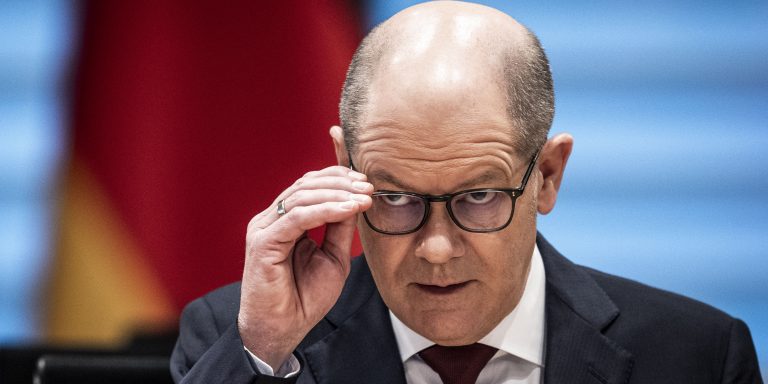INTELBRIEF
March 9, 2022
IntelBrief: Tectonic Shifts in German Foreign Policy Signal More Muscular Approach

Bottom Line Up Front
- Germany has dramatically revolutionized its foreign and security policy, jettisoning the Nord Stream 2 pipeline project, committing to spend an additional 100 billion euros on defense, and sending weapons to Ukraine.
- Germany’s dependence on Russian oil and gas (55% of its gas imports are from Russia), will, however, make it impossible for Berlin to cut off supplies completely.
- Due to Germany’s history and Nazi past, Berlin has long been understandably trepidatious about adopting a militaristic foreign policy and participating in combat missions.
- German Chancellor Olaf Scholz was clear in his reasoning for the shift, declaring that Putin’s actions have resulted in “a new reality” that has led to a renewed commitment to taking a leadership role in European security.
Seemingly overnight, Germany has revolutionized its foreign and security policy, jettisoning the Nord Stream 2 pipeline project and committing to immediately spend an additional 100 billion euros on defense. While pressure on Berlin to adopt a more muscular foreign policy has been building inside Germany for decades, it took Russia’s invasion of Ukraine to open the floodgates. Russian President Vladimir Putin has done more to unify NATO and the West than anyone thought possible. After being widely mocked for sending helmets to Kyiv while the Russians invaded, Germany completely reversed course, and under the direction of new Chancellor Olaf Scholz, Germany is now sending a range of sophisticated weaponry, including stinger missiles and anti-tank weapons, to Ukraine, while also pledging to buy new advanced F-35 fighter jets from the United States. Scholz additionally committed to increasing annual defense spending to at least 2% of its gross domestic product (GDP)—a target for NATO countries’ defense spending—up from 1.5%. Germany also lifted its ban on other countries, including the Netherlands and Estonia, sending German-made weapons to the Ukrainian military.
Yet, because Germany is so dependent on Russian oil and gas (55% of its gas imports are from Russia), it will be impossible for Berlin to cut off supplies completely, as the U.S. and U.K. just pledged to do. Scholz confirmed as much recently, noting that Germany rejects a proposed European embargo on Russian oil imports. However, Scholz proclaimed that Germany would accelerate the construction of two liquefied natural gas (LNG) terminals, in an effort to wean the country off of Russian energy in a sustainable manner. And while Germany will be criticized for not doing enough, it is important to recognize that what took place last week was a tectonic shift in the country’s foreign policy. Beyond Germany, the reverberations from such an about-face will be felt from Washington to Brussels and beyond, and this shift could inspire other European countries to follow suit.
For the past three decades, Germany has tried—successfully at times, unsuccessfully at others—to balance Western security with an ongoing economic relationship with Russia. The center-left Social Democratic Party in particular has favored a tolerant view of Moscow, even when Putin’s belligerence has made that difficult. Due to Germany’s history and Nazi past, Berlin has long been understandably trepidatious about appearing to adopt an overly militaristic foreign policy. But in the aftermath of the attacks of September 11, 2001, many Western officials were critical of Germany, prodding Berlin to spend more on defense and assume a vocal leadership role within NATO. Until its recent overhaul, Germany had consistently failed to spend 2% of its GDP on defense, despite this benchmark as a goal set by NATO member states. This specific point was a constant harangue of former U.S. President Donald Trump, who never missed an opportunity to criticize NATO, and according to some reporting, was even planning to attempt to withdraw the U.S. from the alliance if elected to a second term.
While many in Germany and the West celebrated the apparent death knell of Ostpolitik, Germany’s policy of engaging with Russia through trade and diplomacy, others question whether this newly revamped foreign policy will be sustained, or whether, on the contrary, there will be a regression toward the mean if and when the situation in Ukraine deescalates. Nonetheless, Scholz was clear in his reasoning behind the rapid shift, declaring that Putin’s actions have resulted in “a new reality” that has prompted the need for a newfound leadership role in maintaining European security. Finally, Berlin reconciled, Germany must act for its self-interest and not just as a result of pressure from allies like the United States. The timing is interesting, especially as Germany adjusts to Scholz’s leadership following seventeen years of Angela Merkel’s steady and cautious stewardship. Germany plans to invest significant sums in military hardware including fighter jets, tanks, submarines, helicopters, and ammunition, but also in cybersecurity defense and the accouterments of modern warfare, including sensors and radars.